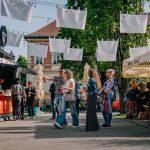”Vaccines are very powerful weapon in the fight against diseases like this. Clinical studies for vaccines last from six to nine months. I don’t believe we will have a vaccine [for coronavirus] before the end of this year,” Krunoslav Capak said.
As Poslovni Dnevnik writes on the 7th of April, 2020, Krunoslav Capak, director of the Croatian Institute of Public Health, told N1 television that the coming weeks were crucial in regard to the further development of the coronavirus epidemic in Croatia.
“We have a lot of people in self-isolation, these people have been in contact with those who are sick [with coronavirus]. It’s important for these people to remain in isolation, and not to have any new contacts. If they fall ill in the meantime, then their contacts will also be at high risk of contracting the disease. We’re trying to create a buffer zone so that the disease doesn’t spread any further,” he said.
Croatia’s strict anti-epidemic measures will not be lifted in the coming period.
“We’re analysing the situation every day, but in the coming weeks, which I repeat, are going to be critical, we aren’t planning on loosening up the measures,” he added.
“We still have a lot of people in self-isolation, about 20,000 of them, many of them have been in contact with those who are sick and newly positive people are coming from that pool of people. It’s very important that they respect the self-isolation measures so that new people don’t fall ill. It’s also very important that we don’t give up now and that we reduce social contact as much as possible. If we manage to contain this, we will have a favourable epidemiological situation,” Krunoslav Capak said. He then answered the question of how people in self-isolation are controlled.
“There are two ways in which that’s done, either the patients report to their doctors and to epidemiologists, or they contact them. Those who develop symptoms suspected of being caused by COVID-19 should go for testing. It is very important that the contact between patients in self-isolation and their physician or an epidemiologist is only made occasionally. I have to mention that the police have a database of people who are in isolation and have the possibility to report any misdemeanor, depending on the nature of the crime,”
Croatia has an optimal number of tests. Is that true?
“It’s very difficult to estimate what that number is. Some tested a lot so they failed to prevent the epidemic. The best example is Italy. Our doctor from Italy, Dr. Nela Srsen, said recently that the Italians were wrong. All those who were negative felt free, which doesn’t mean that they can’t develop COVID-19 the very next day,” he said, explaining where Italy had gone wrong.
“It’s a combination of everything. It was too late to introduce measures already when they had a massive epidemic in the north of the country. The mentality of the people also plays a big role in all this, it isn’t good for citizens to behave nonchalantly, get together, go out for coffee, and that’s what happened there,” explained Krunoslav Capak.
The World Health Organisation (WHO) says it is working hard to find a vaccine. When can we expect it?
“As you know, there are clinical vaccine trials going on in several places across the world. We can hope that they will prove to be good and safe. Vaccines are a very powerful weapon in the fight against diseases like this. Clinical studies of vaccines last from six to nine months. I don’t believe we’ll have a vaccine before the end of this year,”
There is a big rush for passes (propusnice). How are the [civil protection] headquarters handling it?
”The National Civil Protection Headquarters is trying make sure that what is essential to people’s elementary lives isn’t stopped, and it isn’t trying to stand in the way of the economy. As for the epidemiological part – because of the movement of people that occurred at the time of the [Zagreb] earthquake, we introduced this measure, of course, with some exceptions. We aren’t thinking of loosening up the measures on movement restriction at this point because the following weeks are crucial to curbing the spread of the coronavirus infection. After that, we’ll analyse the situation and give priority to the measures introduced,” Capak said.
In the end, Capak sent out a message to residents of Croatia:
“Be patient, listen to the staff’s recommendations for a while longer. If the situation becomes favourable, we will certainly allow some of these measures to be removed to make it easier for people and families to function. Our goal is to curb infections, not to introduce measures and limit the functioning of people and families,” he concluded.
Make sure to follow our dedicated section for more on coronavirus in Croatia.









